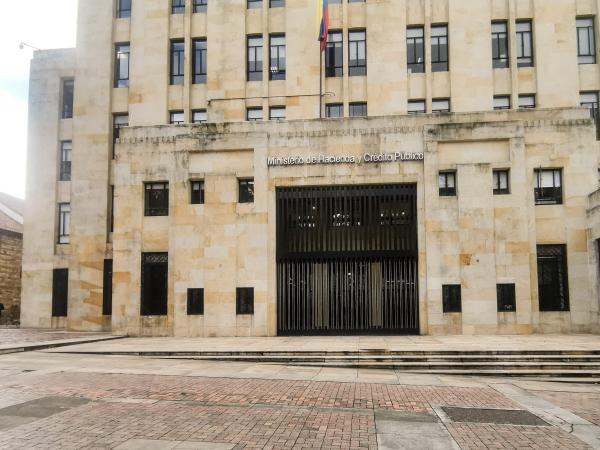Although the process to define how much the General Budget of the Nation will be for next year seems to have been defined and everyone is already waiting for the decree that the Government will issue to regulate its expense and income accounts, there are still many elements that are at stake and recent alerts warn that The investment continues to be seen as the most sacrificed next year if things do not go as expected.
After the failure of the negotiations in Congress, where the Ministry of Finance failed to convince the senators and representatives of the stability of its projections and, on the contrary, the fiscal risk alerts were the protagonists of the talk, the attention of People on the streets and in the market in particular are focused on what ultimately happens with the financing law.
More news: Opposition was left with majorities among the speakers of the Financing Law
Of the $523 billion in spending proposed by the House of Nariño for the next term, only $511 billion has been assured, although with Dian efficiency income estimates that several experts have described as “optimistic” and that maintain the risk that what was seen in is repeated 2024, when spending had to be cut because there was no money to support it.
Recently the Minister of Finance, Ricardo Bonilla, referred to the money whose execution was postponed this year and noted that they will finally be cut. This, while he warned that by 2025 they will take their time, since the law gives them until December 30 to present what is known as the budget regulation decree.
Ricardo Bonilla, Minister of Finance and Public Credit
Screenshot
“The budget project will have to be decreed and we can do it between October 21 and December 30 at any time, and it must go at the same time or with some distance from the liquidation of the 2025 budget,” said Bonilla González.
The head of the Treasury portfolio explained that they must issue two decrees: “one, the budget decree, equivalent to what came out of Congress as the sanction of a law, and second, the budget liquidation decree, which is the distribution of split vertically”; which they hope to have ready before December 30.
Risk of defunding
So far in the budget process for 2025, so far the Ministry of Finance has only justified revenues of $511 billion, since the remaining $12 billion depend on a financing law that was filed almost a month ago, it barely has its appointed speakers. , does not have an emergency message and he already promises to experience a strong debate in the Legislature, where he has strong opposition.
Read here: What will happen to the dollar in Colombia after the elections in the United States?
This project, which some sectors have described as a tax reform, since it does not generate transitory taxes but fundamentally changes the national tax system, is of vital importance for the Government’s accounts, since if it is not approved, the country would enter into a scenario of unsustainability that would make next year’s Budget unconstitutional.
“If the financing law is not processed or a part is processed and approved“On January 2, you have to report whether the budget is financed or not and declare a suspension for the unfunded part,” explained the Minister of Finance, Ricardo Bonilla.

Ministry of Finance and Public Credit.
Photo: CEET – Néstor Gómez
Here it is worth highlighting that one of the constitutional principles that these types of regulations must comply with is sustainability, that is, guaranteeing that expenses are not greater than income, which would be what would end up happening if the law of financing. However, to correct any new developments, a cut in public spending can be made to relieve the State’s treasury.
Three big risks
Recently, the Fiscal Observatory of the Javeriana University published an analysis in which it warns that everything that is happening on this front exposes the country to three major problems that ultimately end up undermining trust. of investors and increasing risk premiums, making development more expensive.
“The first problem revolves around difficulties in budget management. The budget consists of 3 parts. Income, expenses and general provisions. These provisions are a series of legal regulations that have the objective of guaranteeing the execution of the expenditure budget, which govern only during the fiscal year for which they are issued,” they began by explaining.
The Observatory analysts explained that when the budget is approved by decree and this includes the corresponding general provisions, the Executive could not give itself powers that are the exclusive competence of the Congress of the Republic or otherwise it could be contradicting constitutional and legal norms that could generate future demands that seek to overthrow the decree.
You may be interested in: Union Council called for fiscal responsibility with the participation reform
“The second revolves around the imbalance in the Budget with a shortfall of $12 billion. Given that it was not approved in the first debate, the decree must be equal to the proposal submitted by the Government initially (for $523 billion). However, there is no taxation without representation (in a period of peace or normality, only Congress can decree or modify taxes), in such a way that the tax measures necessary to balance the budget cannot be issued by the government via decree,” they stated. .
In simple terms, neither the Ministry of Finance nor the Casa de Nariño can establish or make changes to the tax system, without having the legislative endorsement, with which they continue to depend on the approval of the Financing Law.

Colombian pesos
iStock
Finally, there is the possibility that all this will end with a punishment for public investment and they say that in the current scenario, it is most likely that the legislature will deny the Financing Law, which would force the Government to cut expenses next year.
“In this context, given the rigidities present in investment spendingthe fall in public investment could reach $28 trillion, with negative consequences for economic growth, income redistribution and general well-being. Another problematic point is that, in these situations, the legislature has no say in what expenses to reduce, everything is at the discretion of the government in power,” they explained.
According to the accounts of the National Government, the 2025 budget will amount to $523 billion, of which $324.9 correspond to operating expenses (63%), $112.6 billion to the payment of public debt (21%) and $82.5 billion to the public investment (16%).
Finally, in terms of sectoral distribution, without counting public debt, the sectors with the most resources will be Education with $79 billion (15%), Health and Social Protection with $57 billion (11%) and Labor with $53 billion (10%). ); although from the Javeriana University they suggest waiting to see what happens in Congress.
















